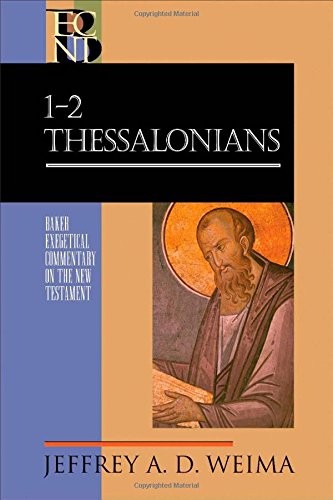Reviewed by Allen Mickle
We seem to live in an unprecedented era of abundance of exceptional commentaries on the Bible. Among the myriad of commentary series being issued from publishers, the Baker Exegetical Commentary on the New Testament is probably, in this reviewer’s opinion, one of the best series based upon the Greek text available. Baker released their newest, 1-2 Thessalonians by Jeffrey A. D. Weima (Professor of New Testament at Calvin Theological Seminary) and it is a welcome addition to the growing corpus of Pauline commentaries.
The Thessalonian epistles receive short shrift from many expositors. There are so many tantalizing elements to consider in Paul’s other letters. Thessalonians are relegated to discussions regarding eschatology. Yet, the letters to the church at Thessalonica are important for the church, therefore important for our careful attention.
Weima begins, in standard fashion, to provide an introduction to both of the Thessalonian epistles together as a whole. He considers historical and cultural aspects of the city of Thessalonica which serve as helpful background to the audience to which Paul is writing. He also considers the church that existed in Thessalonica (its origin and makeup) in order to show how what Paul writes in these two epistles specifically addresses the issues and concerns existing within this church. He surveys the arguments concerning Pauline authorship and argues that both 1 and 2 Thessalonians were written by the Apostle Paul. Finally, Weima considers how the letters are constructed in their epistolary form and provides a thorough breakdown of the structure of both epistles. The introduction is adequate to address all of the pertinent issues of which a reader of the Thessalonian epistles would need to be aware. It is neither overly pedantic nor overly academic, yet it does not fail to address the important academic issues.
Following the introduction, the commentary (as all BECNT volumes do) begins with a helpful thematic overview (in bold), followed by a literary analysis, which is finally followed by exegesis and exposition and additional technical notes of importance. A review of this length and nature can never fully address all of the elements within the text. This review will consider a handful of debated passages to see how Weima handles those matters.
In 1 Thessalonians 1:10, a verse highlighted by those who hold to a pretribulational rapture as a reference to believers not entering into the “wrath” of the Tribulation, Weima does not even discuss this as a possibility. Instead of considering that the wrath may be a technical term for the judgments of the Tribulation, he concludes that it is a simple promise that believers will not experience the final eschatological judgments of God.
1 Thessalonians 2:14–16 is a difficult passage regarding Paul’s condemnation of the Jews for killing the prophets and the Lord Jesus and their resultant wrath. He does not conclude decisively what the wrath they experienced may be (he notes Claudius’ expulsion of the Jews from Rome to be a strong possibility). He argues there was a fixed event in the past that Paul was referring to and of which the Thessalonian believers were aware. Yet, dissatisfyingly, Weima never attempts to reconcile Paul’s harsh words regarding his fellow countrymen with Paul’s strong support of the Jews elsewhere, as in Romans.
In 2 Thessalonians 2:6, which Wannamaker has called one of the “most problematic texts in the Pauline corpus,” Weima breaks the idea down into a force and a person, specifically identified as the work and the person of the archangel Michael. In a detailed excursus he addresses the grammatical and theological reasoning for this position. As with the many options on this passage, Weima’s decision does not provide great satisfaction. For instance, as one who holds that the Holy Spirit is the restrainer here in v. 6, Weima’s dismissal of this view because of the oddity of Paul referring to the Spirit “in such an enigmatic way” could be applied to his own choice of seeing this as the archangel Michael.
Weima writes from a decidedly Reformed covenantal perspective, which necessarily influences his interpretations (as all of our presuppositions influence our own exegesis). That being said, he appears dismissive of some positions as if they are not worthy of careful or detailed interaction simply because they are held by differing hermeneutical approaches (i.e., dispensationalism). And of course, considering there are some strong discussions regarding the nature of the eschaton, it is no wonder that there would be substantive disagreements among the various hermeneutical schools.
This does not abrogate the value of a commentary such as this. All of us need to be exposed to positions and interpretations that are different than ours. Listening to those only in our own camp never challenges us to be the most faithful with the text. So, it is widely recommended to read and consult a solid evangelical commentary like Weima’s if you disagree. It would be just as good for those sympathetic with Weima to consult Hiebert as well.
Therefore, consult Weima for his excellent analysis of the Greek text of the Thessalonian epistles. He does an exceptional job dealing with difficult syntax and textual matters. Also, another strength is his effort at putting 1-2 Thessalonians in their cultural and historical setting. Finally, this strong evangelical commentary would be very helpful in research and teaching and preaching of the Thessalonian epistles. Keep in mind that, just like us, Weima’s theological presuppositions influence some fairly contentious passages that particularly address eschatological issues. That being said, it is good to have our positions challenged, and Weima will helpfully do that.
Allen R. Mickle, Jr. is Pastor of Cornerstone Bible Fellowship Church, Clinton Corners, NY and Adjunct Instructor of Bible and Theology at Summit University, Clarks Summit, PA.
